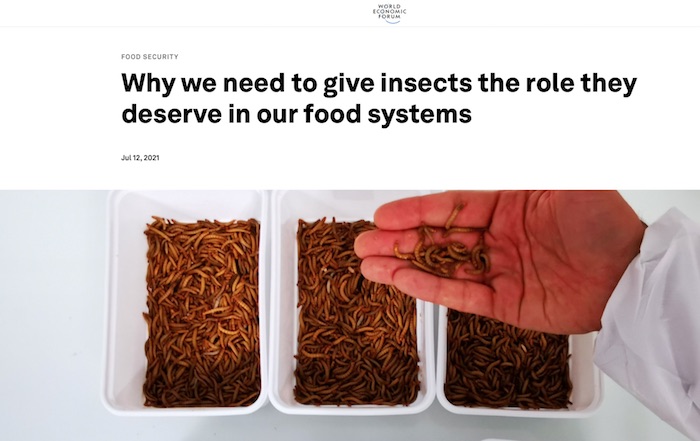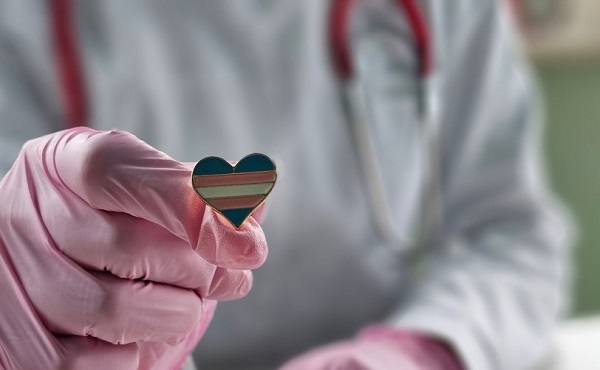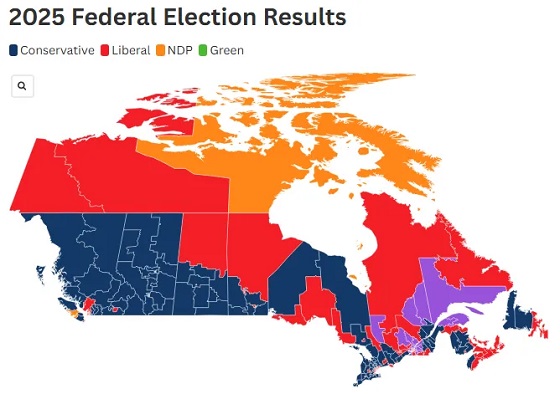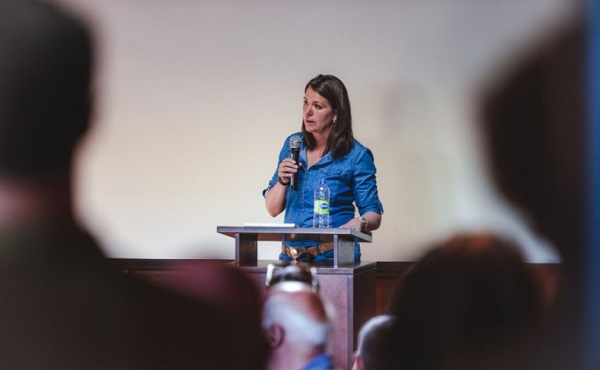Opinion
The federal government wants Canadians to eat bugs.

A few (very few) media outlets have picked up on this recent news release from the Canadian Taxpayers Federation regarding the human consumption of.. Bugs!
Yuck right? Well don’t panic. They’re not quite ready to swap your bowl of Count Chocula for cocoa-flavoured crickets just yet. However it does appear the Liberal government is hoping to put bugs on your menu. The article from the CTF is included below so I urge you to read on because it’s really interesting (and for those with a queasy stomach, just a tad disturbing).
But before you do that, a couple of observations.
First. This is NOT another win for the annoying conspiracy theory people. Sure they may have been spouting off about forcing us to eat bugs, but that doesn’t make this a classic conspiracy theory.
When it comes to conspiracy theories, most of us have always concluded there are just two types of people. There are the KOOKS. And then there are the people who do their best to avoid the kooks. Let’s call the first group the Flat Earthers, and the second group, Everyone Else (or the Rest of Us if you please).
Flat Earthers use evidence no one can verify to draw ridiculous conclusions and make strange accusations. Governments insisting we eat bugs may sound like a ridiculous conclusion formed by evidence no one can verify, but it turns out this is not the case at all.
Why is it that “The Liberal Government Wants Us To Eat Bugs” is not a ‘classic’ conspiracy theory?
Well it’s because of the words ‘conspiracy’ and ‘theory’. They just don’t apply.
The Oxford Dictionary defines conspiracy as “a secret plan by a group of people to do something harmful or illegal.” For one thing there’s nothing illegal about adding bugs to our diet. We’ve never had to make a law about it. Politicians like getting elected, and so it never occurred to them to force bugs onto our plates. Sure you’ll see them flipping pancakes and picking hot dogs off a bbq, but that’s about as ‘harmful’ as they’re willing to get. So there’s nothing illegal and nothing harmful going on. That leaves the part about being a secret.
To prove this isn’t a secret I’m afraid I’m going to have to put 2 and 2 together because we have to talk about the World Economic Forum. They might not be shouting it from the mountaintops, but the World Economic Forum isn’t hiding the fact they’d like us to replace meat protein with bugs. It’s only a secret if you’ve never taken the time to read “Why we need to give insects the role they deserve in our food systems“, or “5 reasons why eating insects could reduce climate change“.
You might think our trusted sources of information would look into this because food is something their readers tend to eat almost every day. Sometimes more than once. They might not even have to go to Davos to check it out. News reporters bump into Deputy PM Chrystia Freeland in the hallways on Parliament Hill all the time. Chrystia Freeland is on the World Economic Forum Board of Trustees If you click the link you can see her there, third person down on the right. If Deputy PM Freeland doesn’t know where to find these articles on the WEF website, as a Board of Trustee member she’ll know who to ask. So this certainly isn’t illegal or particularly harmful, and it’s only a secret to those who don’t read these things or have these things read to them by the information sources we’ve always trusted. The Liberal government might not talk about sharing goals with the WEF every day, but when Canada’s Deputy PM is on the WEF’s Board of Trustees let’s just say it would be odd to think they’re at odds.
The other word in play here is “theory”. When it comes to “conspiracy theory”, the word theory means “theoretical”, as in a theory, but not really happening. Again with the Oxford, second meaning applies here, “that could possibly exist, happen or be true, although this is unlikely”.
One could make a weak argument that Canada’s Deputy PM only goes to Davos to exchange stories with the rich and famous about how ridiculously hard it is to drive the speed limit in Alberta. One ‘theory’ is that she had to make it all the way back to Ottawa in an EV before it got cold. Regardless. Canada’s Deputy PM is a member of the WEF Board of Trustees. So although it could be a coincidence, it is not a theory that the federal government is funding bug – food research. As you’ll see below, the liberals are paying companies to ” promote the consumption of “roasted crickets” or “cricket powder” mixed-in with your morning bowl of cereal. ”
The fact the WEF has been talking about this for years now, the fact our Deputy Prime Minister is on the WEF Board of Trustees, and the fact the federal government is now funding research meant to change Canadians from people who stomp on bugs into people who chomp on bugs.. Well that pretty much takes the theoretical part right out of it.
Now that you’re hungry for more, here is the news release from a new trusted information source, the CTF.
By Ryan Thorpe of the Canadian Taxpayers Federation
Taste the crunch: cricket corporate welfare cost $420K

Bon apétit.
The federal government spent $420,023 since 2018 subsidizing companies that turn crickets into human food.
“Canadians are struggling as inflation pushes up grocery bills, but subsidizing snacks made out of bugs doesn’t sound like the right solution for taxpayers,” said Franco Terrazzano, CTF Federal Director. “If Prime Minister Justin Trudeau wants to take a bite out of crunchy crickets, he can do it without taking a bite out of taxpayers’ wallets.”
The Canadian Taxpayers Federation gathered the list of cricket corporate welfare deals by reviewing the federal government’s proactive disclosure of grants and contributions.
On two separate occasions, the feds cut cheques to a Montreal-based company called NAAK Inc., for a combined cost to taxpayers of $171,695.
The co-founders of NAAK were “introduced … to the benefits of adding insects to (their) diet” by a friend and describe their mission as “democratizing insect consumption.”
NAAK specializes in “cricket energy bars,” but a portion of its corporate welfare money was earmarked for developing other cricket products, including “steaks, sausages and falafels.”
NAAK is one of five companies producing crickets for human consumption that have received corporate welfare deals from the feds in recent years.
Table: Corporate welfare deals, 2018-2022
|
Company |
Number of subsidies |
Total cost of subsidies |
|
NAAK Inc. |
2 |
$171,695 |
|
Entologik Inc. |
2 |
$88,979 |
|
Prairie Cricket Farms |
2 |
$78,349 |
|
Gaia Protein |
1 |
$42,000 |
|
Casa Bonita Foods |
1 |
$39,000 |
Casa Bonita Foods wants to “manufacture high protein snacks made with cricket flour,” while Prairie Cricket Farms promotes the consumption of “roasted crickets” or “cricket powder” mixed-in with your morning bowl of cereal.
The founder of Entologik claims insects are the “protein of the future” and wants to grow the company into “the largest producers and processor of edible insects in Canada.”
“The feds are having their ‘let them eat crickets’ moment,” Terrazzano said. “If someone can sell crickets as food, we wish them the best of luck, but taxpayers shouldn’t be paying for it.”
An additional $8.7 million in subsidies went to Aspire Food Group, which operates a cricket processing plant in London, Ont. In total, the company received four separate handouts.
While the company is primarily geared toward pet food production, its owner said about 10 per cent of its business uses crickets for human food.
Mental Health
Headline that reads ‘Ontario must pay for surgery to give trans resident both penis and vagina: appeal court’ a sign of the times in Canada

From LifeSiteNews
Gender ideology so entrenched, surgical mutilation is no longer considered fringe
If you’d like a glimpse of what 10 years of progressive rule has done to Canada in a single sentence, I submit to you this April 24 headline: “Ontario must pay for surgery to give trans resident both penis and vagina: appeal court.”
Imagine reading a headline like that in, say, 2010. You’d wonder what country you were living in — that is, if you weren’t trying to figure out what you just read. But in Canada in 2025, this stuff isn’t fringe. It’s establishment.
The Ontario Court of Appeal, the province’s top court, issued a ruling this week stating that the province must pay for a “penile-sparing vaginoplasty” for a resident who identifies as transgender but does not identify “exclusively” as either male or female and thus would like to possess both a penis and a vagina.
According to the Post, “a three-judge panel of the Ontario Court of Appeal confirmed a lower court’s ruling that the novel phallus-preserving surgery qualifies as an insured service under the Ontario Health Insurance Plan.” In case you’re tempted to write this off as an aberration at the hands of a handful of activist judges, this ruling is the third unanimous decision in favor of the “patient,” identified in court records as “K.S.”
“K.S. is pleased with the Court of Appeal’s decision, which is now the third unanimous ruling confirming that her gender affirming surgery is covered under Ontario’s Health Insurance Act and its regulation,” K.S.’s lawyer, John McIntyre, told the Post. K.S., as it turns out, identifies as neither male nor female … but uses female pronouns:
The legal battle between K.S., whose sex at birth was male, dates to 2022, when the Ontario Health Insurance Plan (OHIP) refused her request to pay for the cost of surgery at a Texas clinic to construct a vagina while sparing the penis, a procedure this is not available in Ontario, or anywhere else in Canada. K.S. uses female pronouns but does not identify as either fully female or fully male.
Previously, saner generations would have no idea how to interpret the preceding paragraph, but gender ideology has made fools of us all. OHIP attempted to argue that “because the vaginoplasty would not be accompanied by a penectomy, the procedure isn’t one specifically listed in OHIP’s Schedule of Benefits and therefore shouldn’t be publicly funded” and also that the surgery is “experimental” in Ontario and thus can’t be covered.
But K.S., who has a male member but would also like a neo-vagina, appealed to the Health Services Appeal and Review Board, which overturned OHIP’s decision. OHIP appealed to the Divisional Court but lost; the latest appeal, heard November 26, was also rejected because a “penectomy,” the removal of the penis, was “neither recommended by K.S.’s health professionals nor desired by K.S.,” according to the court’s decision.
I wonder if the judges thought that they’d be ruling on whether a man who identifies as neither a man or a woman was entitled to obtain a vagina while retaining his penis when they were going to law school.
The court stated that K.S., who is in his early 30s, “has experienced significant gender dysphoria since her teenage years, as well as physical, mental and economic hardships to transition her gender expression to align with her gender identity.” Of course, K.S. isn’t “transgender,” per se — because he doesn’t identify as the opposite sex, even though he uses the pronouns of the opposite sex. He wants to be … both, somehow. And he wants the taxpayer to pay for it.
As the Post reported:
K.S.’s doctor submitted a request to OHIP for prior funding approval for the surgical creation of a vaginal cavity and external vulva. The request made it clear that K.S. wasn’t seeking a penectomy. In a letter accompanying the request, her doctor said that because K.S. is “not completely on the ‘feminine’ end of the spectrum” it was important for her to have a vagina while maintaining her penis, adding that the Crane Center for Transgender Surgery in Austin, Tx.,” has an excellent reputation” for gender-affirming surgery, “and especially with these more complicated procedures.”
The surgeries, depending on which are performed, range in cost “from US $10,000 to $70,000.” The court also ordered Ontario to pay K.S. $23,250 after dismissing OHIP’s appeal; the province has until June 23 to seek leave to the Supreme Court of Canada.
Alberta
Preston Manning: Canada is in a unity crisis

 Preston Manning
Preston Manning
A Canada West Assembly would investigate why
The election of a minority Liberal government on Monday, and the strong showing of the Conservative party under Pierre Poilievre, cannot mask the fact that Canada remains seriously fractured on many fronts. Thus, one of the primary tasks of the Carney government will be to unite us for the sake of our own national well-being — not simply for the sake of presenting a strong front in future dealings with the United States.
But how is that to be done? When parliament meets as scheduled on May 26, will the government’s throne speech acknowledge the main sources of national disunity and propose the immediate adoption of remedial measures? Or will it ignore the problem entirely, which will serve to further alienate Quebec and the West from Ottawa and the rest of Canada, and weaken Canada’s bargaining position vis a vis the United States?
The principal tactic employed by the Liberal party to unite Canadians behind it in the recent election was to employ the politics of fear — fear of U.S. President Donald Trump trying to “break us so that America can own us,” as Liberal Leader Mark Carney has repeatedly said.
But if the only way to unite Canadians is through the promotion of anti-Americanism fostered by fear of some alleged American takeover — if reaction to the erratic musings of an American president is the only way to motivate more Canadians to vote in a federal election — then not only national unity, but Canadian democracy itself, is in critical condition.
We need to pinpoint what actually is fracturing the country, because if we can clearly define that, we can begin the process of removing those divisive elements to the largest extent possible. Carney and the Liberals will of course declare that it is separatist agitations in Quebec and now the West that is dividing us, but these are simply symptoms of the problem, not the cause.
Here, then, is a partial list of what underpins the division and disunity in this country and, more importantly, of some positive, achievable actions we can take to reduce or eliminate them.
First and foremost is the failure to recognize and accommodate the regional character of this country. Canada is the second-largest country by area on the planet and is characterized by huge geographic regions — the Atlantic, Central Canada, the Prairies, the Pacific Coast and the Northern territories.
Each of these regions — not just Quebec — has its own “distinctive” concerns and aspirations, which must be officially recognized and addressed by the federal government if the country is to be truly united. The previous Liberal government consistently failed to do this, particularly with respect to the Prairies, Pacific and Northern regions, which is the root of much of the alienation that even stimulates talk of western separation.
Second is Ottawa’s failure to recognize and treat the natural resources sector as a fundamental building block of our national economy — not as a relic from the past or an environmental liability, as it was regarded by the government of former prime minister Justin Trudeau.
Will the throne speech announce another 180-degree turn for the Liberal government: the explicit recognition that the great engine of the Canadian economy and our economic recovery is not the federal government, as Carney has implied, but Canada’s agricultural, energy, mining, forestry and fishery sectors, with all the processing, servicing, manufacturing and knowledge sectors that are built upon them?
A third issue we’ve been plagued with is the division of Canadian society based on race, gender, sexual preferences and other identity traits, rather than focusing on the things that unite us as a nation, such as the equality of all under the law. Many private-sector entities are beginning to see the folly of pursuing identity initiatives such as diversity, equity and inclusion that divide rather than unite, but will the Liberal government follow suit and will that intention be made crystal clear in the upcoming throne speech?
A final issue is the federal government’s intrusion into areas of provincial jurisdiction — such as natural resources, health, municipal governance, along with property and civil rights — which is the principal cause of tension and conflict between the federal and provincial governments.
The solution is to pass a federal “act respecting provincial jurisdiction” to repeal or amend the statutes that authorize federal intrusions, so as to eliminate, or at least reduce, their intrusiveness. Coincidentally, this would be a legislative measure that both the Conservatives and the Bloc could unite behind if such a statute were to be one of the first pieces of legislation introduced by the Carney government.
Polling is currently being done to ascertain whether the election of yet another Liberal government has increased the growing estrangement of western Canada from Ottawa and the rest of Canada, notwithstanding Carney’s assurances that his minority government will change its policies on climate change, pipelines, immigration, deficit spending and other distinguishing characteristics of the discredited Trudeau government.
The first test of the truthfulness of those assurances will come via the speech from the throne and the follow-up actions of the federal government.
Meanwhile, consultations are being held on the merits and means of organizing a “Canada West Assembly” to provide a democratic forum for the presentation, analysis and debate of the options facing western Canada (not just Alberta) — from acceptance of a fairer and stronger position within the federation based on guarantees from the federal government, to various independence-oriented proposals, with votes to be taken on the various options and recommendations to be made to the affected provincial governments.
Only time will tell whether the newly elected Carney government chooses to address the root causes of national disunity. But whether it does so or not will influence the direction in which the western provinces and the proposed Canada West Assembly will point.
Preston’s Substack is free today.
But if you enjoyed this post, you can tell Preston’s Substack that their writing is valuable by pledging a future subscription.
-

 Alberta22 hours ago
Alberta22 hours agoNew Alberta Election Act bans electronic vote counting machines, lowers threshold for recalls and petitions
-

 Alberta22 hours ago
Alberta22 hours agoHours after Liberal election win, Alberta Prosperity Project drumming up interest in referendum
-

 Alberta1 day ago
Alberta1 day agoPremier Danielle Smith responds to election of Liberal government
-

 Automotive2 days ago
Automotive2 days agoMajor automakers push congress to block California’s 2035 EV mandate
-

 Banks23 hours ago
Banks23 hours agoTD Bank Account Closures Expose Chinese Hybrid Warfare Threat
-

 2025 Federal Election23 hours ago
2025 Federal Election23 hours agoPost election…the chips fell where they fell
-

 Alberta14 hours ago
Alberta14 hours agoPremier Danielle Smith hints Alberta may begin ‘path’ toward greater autonomy after Mark Carney’s win
-

 Mental Health2 days ago
Mental Health2 days agoSuspect who killed 11 in Vancouver festival attack ID’d



